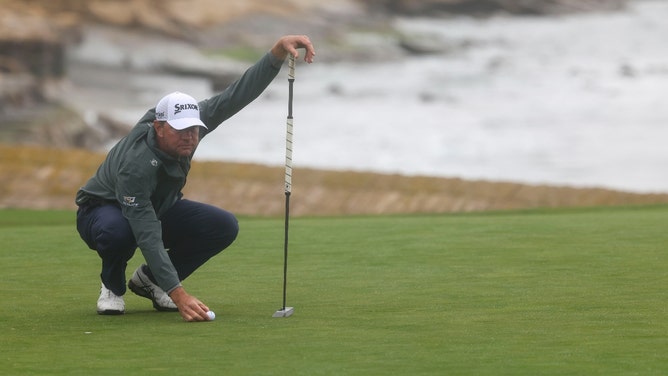Collin Morikawa Sounds Salty And Foolish Trying To Clap Back At Lucas Glover's Suggestion About Slow Play
There is a pace of play problem on the PGA Tour. That isn't an opinion, that is a fact, and it has been a major talking point through the first couple of months of the newest season. Players are getting slower, routines are getting longer, and the Tour refuses to enforce the rules that would force players to speed things up.
Instead of sitting back and tossing out some blanket statement like ‘guys just need to play faster,’ former U.S. Open champion Lucas Glover recently shared one solution that he, and plenty of others, believe would speed up play, and that is banning AimPoint.
AimPoint is a green reading technique, and in the most basic description, players use their feet to gauge the slope of a putt, grade it, and then hold one to four fingers in front of their eyes in relation to the cup and go from there. The longer the putt, the more walking and feeling with the feet a player does, which can result in not only players leaving footprints near the hole, but slowing the pace of play down on the greens to a glacial pace.
Recently speaking about the pace of play on Tour during his show on SiriusXM PGA Tour Radio, Glover did not hold back with his opinions about AimPoint.
"It’s also kinda rude to be up near the hole, stomping around, figuring out where the break is in your feet," he said. "It needs to be banned. It takes forever," Glover said after claiming there are no statistics to back up AimPoint actually improving player's numbers on the greens.

Lucas Glover wants AimPoint banned on the PGA Tour, which did not sit well with Collin Morikawa. Credit: Kiyoshi Mio-Imagn Images
Collin Morikawa, the No. 4 player in the world, has used the AimPoint technique for quite some time. When asked about Glover's suggestion to ban it, he turned a bit defensive and suggested that if AimPoint is going to be banned, long putters should be banned as well. Glover has used a broomstick-style putter for a few years now after enduring putting yips for close to a decade.
"I have nothing against Lucas, but if we're banning AimPoint I think we should ban long putters as well," Morikawa said. "I don't know. I guess no one has said it, right? Like let's just -- look, AimPoint does take longer if you're not doing it properly, right, if you're not doing it when other players are reading their putts.
"I think there's a respect issue. I think some players might get a little bit too close to the hole and I get that. When you get too close to the hole when someone else is putting, yeah, like I don't want my line and my putt to go over someone else's foot and their marks."
"I don’t think people understand how AimPoint works to really say this is right or wrong. Does it slow down play? I think there are some players that maybe do it in the wrong spots," Morikawa continued. "And sometimes, look, I’ll admit it, maybe I can’t get in when I want to so (AimPoint) adds a couple more seconds. But I know that and I’m aware of that. I think players need to be aware if they’re slow or not, right? Like let people know who is slow and do something about it, right?"
It's easy to get lost in the ‘drama’ in a situation like this, because players going back-and-forth at each other through the media is incredibly rare in golf, but if you take three seconds to realize what Morikawa said, it makes no sense whatsoever, because the two things are not related.
AimPoint slows down play far more often than not, even Morikawa admitted that he takes a few extra seconds every now and again. The length of a player's putter has absolutely zero impact on the pace of play.
Morikawa reiterated that he had nothing against Glover before explaining that he was sticking up for himself and the other AimPoint guys out on Tour. In the long run, Morikawa was just saying something to say something, yet that something wasn't remotely related to the real issue at hand, which is pace of play.